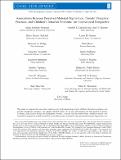| dc.contributor.author | Anika Schenck‐Fontaine, Jennifer E Lansford, Ann T Skinner, Kirby Deater‐Deckard, Laura Di Giunta, Kenneth A Dodge, Paul Oburu, Concetta Pastorelli, Emma Sorbring, Laurence Steinberg, Patrick S Malone, Sombat Tapanya, Liliana M Uribe Tirado, Liane P Alampay, Suha M Al‐Hassan, Dario Bacchini, Marc H Bornstein, Lei Chang | |
| dc.date.accessioned | 2022-01-20T11:49:24Z | |
| dc.date.available | 2022-01-20T11:49:24Z | |
| dc.date.issued | 2020 | |
| dc.identifier.uri | https://repository.maseno.ac.ke/handle/123456789/4421 | |
| dc.description.abstract | This study investigated the association between perceived material deprivation, children’s behavior problems, and parents’ disciplinary practices. The sample included 1,418 8- to 12-year-old children and their parents in China, Colombia, Italy, Jordan, Kenya, the Philippines, Sweden, Thailand, and the United States. Multilevel mixed- and fixed-effects regression models found that, even when income remained stable, perceived material deprivation w associated with children’s externalizing behavior problems and parents’ psychological aggression. Parents’ disciplinary practices mediated a small share of the association between perceived material deprivation and children’s behavior problems. There were no differences in these associations between mothers and fathers or between high and low- and middle-income countries. These results suggest that material deprivation likely influences children’s outcomes at any income level | en_US |
| dc.publisher | Wiley | en_US |
| dc.title | Associations Between Perceived Material Deprivation, Parents’ Discipline Practices, and Children’s Behavior Problems: An International Perspective | en_US |
| dc.type | Article | en_US |

